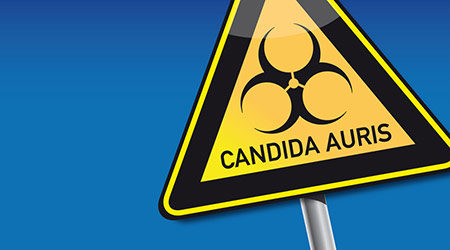Candida auris (C. auris), an emerging, often drug-resistant yeast that can cause invasive infections with high mortality, can spread quickly. It can persist on environmental surfaces for weeks and has caused outbreaks in healthcare settings, where it can spread through contact with contaminated surfaces or equipment, or from person to person.[i]
Preventing C. auris transmission requires diligent adherence to infection control recommendations, including placing patients colonized or infected with C. auris in single rooms on Standard and Contact Precautions; emphasizing adherence to hand hygiene, thorough cleaning and disinfecting with appropriate products, screening contacts of newly identified patients and conducting surveillance for new cases; and inter-facility communication about patient’s C. auris status prior to transfer.
Below are a few tips to enhance environmental disinfection, based on current Centers for Disease Control and Prevention (CDC) recommendations for infection prevention and control in acute care settings: [ii]
Choose the right products. The CDC recommends daily and terminal cleaning and disinfection with an Environmental Protection Agency (EPA)-registered hospital-grade disinfectant listed on EPA List K, a list of disinfectants that are effective against Clostridioides difficile (C. difficile) spores.Clorox Healthcare® Bleach Germicidal Disinfectants are an example of products effective against C. difficile.
Think beyond just high-touch surfaces. C. auris has been cultured from multiple locations in patient rooms, including both high-touch surfaces, such as bedside tables and bedrails, and locations further away from patients, such as windowsills. C. auris has also been identified on mobile equipment, such as glucometers, temperature probes, blood pressure cuffs, ultrasound machines, nursing carts, and crash carts.
Be meticulous. Thorough daily and terminal cleaning and disinfection is necessary to reduce the risk of transmission, so it is important to follow the directions for use of all disinfectants, including ensuring that a disinfectant stays wet on the surface for the correct and full contact time. Meticulous daily and terminal cleaning and disinfecting is necessary in patient rooms and other care areas and any shared or mobile equipment must be thoroughly cleaned and disinfected between patients.
Educate and monitor to ensure compliance. It is important to educate all clinical and EVS personnel about C. auris and the steps necessary to prevent transmission. Supervised cleaning of impacted areas can help support adherence to good infection control practices. Increased attention to detail and monitoring for compliance should include:
• Surfaces and equipment in patient room
• Surfaces and equipment in other areas where patients receive care, such as radiology and physical therapy
• Mobile and shared equipment (e.g., ventilators, physical therapy equipment, axillary thermometers).
Richard Lowe, PhD, MPH, is an Associate Research Fellow for Clorox Healthcare.
[i] https://www.cdc.gov/fungal/candida-auris/c-auris-health-qa.html. (Accessed May 20, 2019)
[ii] https://www.cdc.gov/fungal/candida-auris/c-auris-infection-control.html. (Accessed May 20, 2019)

 The High Cost of Healthcare Violence
The High Cost of Healthcare Violence EVS Teams Can Improve Patient Experience in Emergency Departments
EVS Teams Can Improve Patient Experience in Emergency Departments East Tennessee Children's Hospital to Become Dolly Parton Children's Hospital
East Tennessee Children's Hospital to Become Dolly Parton Children's Hospital The Future of the Global Hospital Hygiene Market
The Future of the Global Hospital Hygiene Market Rethinking Fire Safety Inspections
Rethinking Fire Safety Inspections